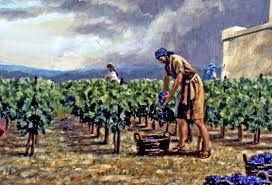This is our last week in studying Elijah. Next week is the study group’s Christmas Party. This week we will be reading about Naboth’s Vineyard in 1 Kings 21 and Elijah’s assumption in 2 Kings 2. Please read these chapters and the intervening chapters as well.
Naboth’s Vineyard: (1 Kings 21:1-19)
Naboth was an ordinary landowner who owned a vineyard next to Ahab’s winter palace in the city of Jezreel. Ahab goes to Naboth and offers to either trade him a better vineyard or to pay him fair market value in return for his vineyard. The problem is that in ancient Israel, however, land is not an asset that can be sold or traded away. Rather, it is, as Naboth says, “an inheritance of my ancestors.” We see this idea throughout the Law, where ancestral land is to be returned in the year of Jubilee or to be redeemed by family members. Lev. 18:8-28. Land is basically inalienable and must remain within the family lineage. Num. 27:11, 36:7. Naboth simply cannot comply with Ahab’s request.
Ahab returns to the palace after these failed negotiations and sullenly complains to Jezebel. He tells Jezebel that he offered Naboth money or alternatively offered him a land swap, but Naboth said “no.” Ahab does not tell Jezebel that his first offer was to trade Naboth a better vineyard and he does not tell Jezebel that Naboth’s refusal of his offers is grounded in Naboth’s understanding that he simply lacks the power to transfer his ancestral lands to anyone, even the king.
Jezebel takes matters into her own hands. She arranges for perjured testimony that Naboth has dishonored the king and committed blasphemy. For his offense, Naboth is stoned, and his land is there for Ahab to take. Jezebel does not tell Ahab how Naboth died, and Ahab does not inquire.
Elijah and Ahab: (1 Kings 21:20-29)
God calls Elijah to go to Ahab and pronounce judgment upon him. This is similar to Nathan’s visit to King David after the Uriah/Bathsheba incident in 2 Samuel 12. Unlike on Mount Carmel, Elijah does exactly what God asks. He goes to Ahab. He tells Ahab that the blood of Naboth is on his hands. Elijah has now become the prophet he is supposed to be. A champion of ethical demands and an advocate for justice.
Like David before Nathan, so too does Ahab before Elijah repent. He rents his clothes, puts on sackcloth, and fasts. Ahab’s humility and repentance cause God’s judgment upon him to be stayed. Unlike on Mount Carmel, it was not power and violence that caused Ahab’s change of heart, but a true humility and recognition of his wrong. Not only Ahab, but Elijah himself has spiritually matured.
Moral Lesson:
Once more in the story of Elijah and Ahab, we should see ourselves. In Matthew 23, Jesus denounces the Pharisees and the Lawyers. There he accuses his audience of slavish obedience to the letter of the Law, while neglecting justice, love, and mercy. v.23. Jesus calls such men white-washed tombs. v.27. When we first met Elijah, his zealousness was like that of the Pharisees. He was zealous for God, or at least the idea of God that he had constructed within his own mind. Over the last several chapters, God has sought to refocus Elijah on the true reality of justice, love, and mercy, and not on defending himself and his beliefs using the name of God. In the story of Naboth, we finally see Elijah getting the point.
Dinner is at 6. The menu is sweet potato lasagna. Discussion about 6:45. Hope to see you here!
He has showed you, O man, what is good; and what does the Lord require of you but to do justice, and to love kindness, and to walk humbly with your God?
Micah 6:8

